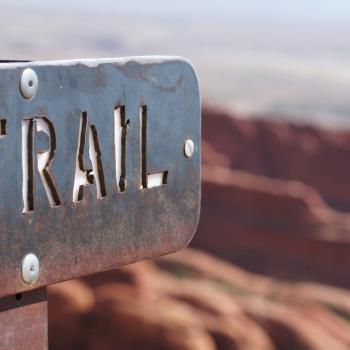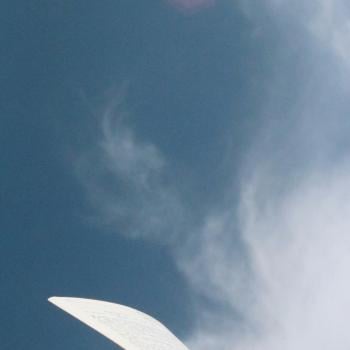
Scripture: Psalm 81; Daniel, chapters 3-4; Revelation, chapter 17
Daniel 4:19-27 (NASB) – Then Daniel, whose name is Belteshazzar, was appalled for a while as his thoughts alarmed him. The king responded and said, “Belteshazzar, do not let the dream or its interpretation alarm you.” Belteshazzar replied, “My lord, if only the dream applied to those who hate you, and its interpretation to your adversaries! The tree that you saw, which became large and grew strong, whose height reached to the sky and was visible to all the earth, and whose foliage was beautiful and its fruit abundant, and in which was food for all, under which the animals of the field lived and in whose branches the birds of the sky settled – it is you, O king; for you have become great and grown strong, and your majesty has become great and reached to the sky, and your dominion to the end of the earth.
And in that the king saw an angelic watcher, a holy one, descending from heaven and saying, ‘Chop down the tree and destroy it; yet leave the stump with its roots in the groups, but with a band of iron and bronze around it in the new grass of the field, let him be drenched with the dew of heaven, and let him share with the animals of the field until seven periods of time pass over him,’ this is the interpretation, O king, and this is the decree which has come upon my lord the king: that you be driven away from mankind and your dwelling place be with the animals of the field, and you be given grass to eat like cattle and be drenched with the dew of heaven; and seven periods of time will pass over you, until you recognize that the Most High is ruler over the realm of mankind and bestows it on whomever He wishes. And it that it was commanded to leave the stump with the roots of the tree, your kingdom will remain as yours after you recognize that it is Heaven that rules.
Therefore, O king, may my advice be pleasing to you: wipe away your sin by doing righteousness, and your wrongdoings by showing mercy to the poor, in case there may be a prolonging of your prosperity.”
Observations:
Part 1: The Fiery Furnace. The first part of our reading from the book of Daniel is the familiar story of Shadrach, Meshach, and Abednego, who refused to bow down to the statue that Nebuchadnezzar had erected. His command had been that everyone would bow down, but these three refused because of their obedience to the one true God. They famously had told Nebuchadnezzar: “Our God whom we serve is able to rescue us from the furnace of blazing fire; and He will rescue us from your hand, O king. But even if He does not, let it be known to you, O king, that we are not going to serve your gods nor worship the golden statue that you have set up” (Daniel 3:17-18). Nebuchadnezzar was furious! He ordered the furnace to be heated seven times hotter than normal. Once the furnace was ready, he had the three Hebrews bound and thrown into the fire.
Of course, God delivered them, just as they said He would! Afterwards, Nebuchadnezzar seemed to have a change of heart. He proclaimed that no one should say anything offensive about God. His reason? “There is no other god who is able to save in this way” (3:29).
Part 2: Nebuchadnezzar’s Dream. But that change of heart didn’t last long. God warned Nebuchadnezzar through the dream that he had. Daniel interpreted the dream and told Nebuchadnezzar exactly what would happen. He pleaded with the king to change his ways: wipe away your sin by doing righteousness, and your wrongdoings by showing mercy to the poor, in case there may be a prolonging of your prosperity. God had acted in mercy like that before. When the people of Nineveh repented, God relented and spared the city. When good kings of Israel and Judah repented, God established them and their kingdoms. God is just, but he is also merciful. Daniel did his best to convince Nebuchadnezzar to turn to God before it was too late.
But Nebuchadnezzar did not change. Daniel’s statement from the interpretation of the dream rings out: It is you, O king! Nebuchadnezzar revealed the problem in his statement in verse 28: “Is this not Babylon the great, which I myself have built as a royal residence by the might of my power and for the honor of my majesty?” Immediately – “while the word was still in the king’s mouth” – God’s judgment came.
Fortunately for Nebuchadnezzar, the judgment was only temporary. Nebuchadnezzar came to his senses, and acknowledged God as the sovereign of the universe: “…my reason returned to me, and I blessed the Most High and praised and honored Him who lives forever” (4:34). God restored him to power, just as the dream had foretold. And Nebuchadnezzar continued to honor God, presumably for the rest of his reign. Chapter 4 closes: “Now I, Nebuchadnezzar, praise, exalt, and honor the King of heaven, for all His works are true and His ways just; and He is able to humble those who walk in pride” (4:37).
Application: I think there are a number of things to take from our readings for today. First, God’s people must not be afraid to “speak truth to power.” Shadrach, Meshach, and Abednego told the king the truth. They would not bow down to his idol. Their God was able to deliver them, but even if He didn’t, they still would obey. This was a direct response to Nebuchadnezzar’s question to them. He asked, “What god is there who can rescue you from my hands?” (3:15). Their God could – and did. They trusted God, and spoke truth to power, rather than trying to protect themselves.
Daniel also spoke truth to power. He knew what Nebuchadnezzar’s dream meant, and he told the king the truth. But he didn’t just interpret what the dream meant; he encouraged the king to repent. Daniel didn’t sugar-coat the truth. He didn’t enable Nebuchadnezzar’s ego. Daniel pleaded with the king to change, in the hope that God might again act in mercy.
In spite of the example of the three Hebrews, and in spite of Daniel’s pleading, Nebuchadnezzar didn’t change. Nebuchadnezzar didn’t repent until after God humbled him. But even that is a sign of God’s mercy – because God didn’t have to restore Nebuchadnezzar at all. God is Sovereign; we are called to acknowledge that, and act accordingly. As Nebuchadnezzar proclaimed at the end of his period of humbling: “His dominion is an everlasting dominion, and His kingdom endures from generation to generation. All the inhabitants of the earth are of no account, but He does according to His will among the army of heaven and among the inhabitants of earth; and no one can fend off his hand or say to Him, ‘What have You done?’” (4:34-35).
Prayer: Father, thank you for the warning that is implicit in today’s reading. We must guard against the sort of pride that led to Nebuchadnezzar’s humbling. We can be just as proud spiritually as he was humanly – and that’s even more dangerous. Help us to be humble and obedient to you.
Help us also to have the courage to “speak truth to power” – even if that power seems to be established by you. Nebuchadnezzar had conquered Judah at your direction, and with your help. That did not mean that he was perfect. He needed the warnings of the righteous men around him, even though he didn’t listen at first. Had Shadrach, Meshach, and Abednego not been faithful, Nebuchadnezzar wouldn’t have had their example to remind him our Your power and faithfulness. Had Daniel not been willing to speak your truth to the king, Nebuchadnezzar wouldn’t have known about the God who brought these things to pass. Give us the wisdom and courage to speak for you, and to stand for you. Help us, when it needs to be done, to be willing to say, “It is you, O king!” Amen.












